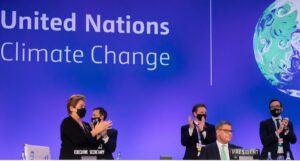COP 26: A Rocha press release
COP26 fails to deliver on its key objectives but holds out hope of progress next year
COP26, which was hosted by the UK, ended in Glasgow, a day late, on Saturday evening 13 November. It failed to deliver on its two most important objectives: achieving a level of greenhouse gas reduction pledges which would equate with keeping global temperature rise to no more than 1.5 degrees above the pre industrial average; and delivering on the past promise to provide $100bn a year (by 2020) to help developing countries go green and adapt to climate change.
The agreement, called the Glasgow Climate Pact, does, however, request countries to update their pledges in line with 1.5 degrees in the next year, and commits to considering the adequacy of the aggregated pledges at the COP in 2022, instead of waiting until 2025 as originally planned. It also promises a meeting of Ministers in the year ahead to try to achieve the long promised climate finance flows, while also acknowledging that developing countries already need much more than the originally promised amount.

Photo: Christoph Soeder/dpa [Photo via MaxPPP]
More progress was made in recognising the seriousness and importance of certain issues. Importantly, the text refers to the need to ‘phase down’ coal production, though this was watered down from ‘phase out’. There was also recognition of the need to end subsidies to fossil fuels, though oil producing countries had this caveated to ‘inefficient’ subsidies. Specialists argue that there is no such thing as an ‘efficient’ subsidy for fossil fuels when they are disrupting global climate.
Also significant was the recognition that addressing climate change will require protecting the world’s remaining forests and other ‘carbon sinks’ such as wetlands and grasslands, and restoring these at scale. An agreement early in the conference on ending deforestation was signed by over 120 nations, and whilst a roadmap to achieving change was lacking, there seems more intention to act this time after a similar pledge ten years ago failed to stop the destruction.
A Rocha welcomes this recognition of the value of ‘Nature-based Solutions to climate change though it stresses that there can be no substitute for getting off fossil fuel urgently in a situation where the latest science, acknowledged by the Glasgow Climate Pact, shows that that global carbon emissions must fall by 45% by 2030, compared to 2010 levels to have a reasonable chance of avoiding climate catastrophe.
Developing country representatives return home with little by way of new assistance for their countries but some lower profile agreements from COP26 may give some campaigners more hope of influencing their own governments.
Seth Appiah-Kubi, CEO of A Rocha Ghana, and co-leader of the A Rocha COP26 delegation, says the continuing lack of climate finance is damaging for Ghana but the Glasgow agreement to end deforestation could help.
“The Atewa forest is threatened by a major bauxite mine and deforestation. Currently, Atewa is not just home to an incredible diversity of wildlife but also provides fresh water to over 5 million people from rivers that rise in, and are fed by, the rainforest. Local people need the forest for their livelihood and well-being. We are returning home from COP26 with limited finance for climate mitigation and adaptations. But now our President has signed the Glasgow agreement to end deforestation by 2030, we hope our government will listen to local people and call off the mining plans which would destroy Atewa for people and wildlife”
The lack of decisive breakthroughs on the critical issues of finance and emissions cuts, coupled with agreement to return to them in 2022, adds pressure on wealthier nations to give much greater priority to domestic climate policy and action in the year ahead. It also suggests the critical importance of maintaining and growing public pressure for change. Soohwan Park, Chair of A Rocha International said
`We are seeing a surge in Christians and Churches taking their responsibility for caring for the environment much more seriously, and joining with others in demanding governments do so too. The result of COP26 will spur more action. A Rocha is scaling up in many countries to support all Christians and churches to act effectively – whether campaigning in Ghana to protect their precious Atewa forest from mining, protecting salmon streams in British Columbia or mobilising thousands through Eco Church in the UK”.
